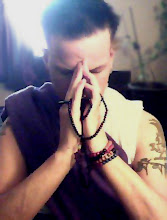This is a snip from an article posted in The Medical Marijuana Review
Buddhists have used cannabis in tandem with
meditation practices “as a means to stop the mind and enter into a state of
profound stillness, also called Samadhi.” They add: “Various
spiritual texts, including the Buddhist Tara Tantra, list cannabis as an
important aide [sic] to meditation and spiritual practice.”
One source notes that Buddha himself believed cannabis was a cure for rheumatism.
One source notes that Buddha himself believed cannabis was a cure for rheumatism.
Brian Ruhe, of the Theravada Buddhist
Community of Vancouver, sides with the Dalai Lama on the issue.
“I’m in favor of [medical marijuana] as well.
I explain it by saying the idea of medical marijuana is reducing suffering, and
reducing suffering is good. In this case it’s reasonable, showing intelligent
use for that situation,” he adds.
Ruhe has been a practicing Buddhist
for 22 years and spent seven months as a Buddhist monk in Thailand in
1996.
“Medical marijuana is OK because Buddhism is a
path of intelligence, discernment and compassion, not just following rules,” he
contends.
“The Buddha said his teachings were not
internally inconsistent because sometimes he would say one thing to a
person, and something else to someone else. This is an example.”
Brian Ruhe, of the Theravada Buddhist
Community of Vancouver
Ruhe, also the author of two books on
meditation and a teacher of university-level courses on Buddhist philosophy and meditation,
emphasizes that the medicinal aspect is key. “You should avoid recreational
marijuana, to avoid deluding thoughts.”
Sean Hillman, a Buddhist scholar-practitioner
and a University of Toronto doctoral student in Religion, Bioethics and South
Asian Studies, says that “it is difficult to establish an authoritative stance”
on many issues.
As such, “what people choose to ingest is
their private business, not subject to Buddhist religious scrutiny,” Hillman
notes.
He spent 13 years as a Buddhist monk, ordained
by the Dalai Lama. His research straddles religious studies and medical
anthropology, with a strong interest in the interaction between religion and
end-of-life decision making.
“Simply, when the pain at hand is addressed
without any intoxicating side effects, medication has
been administered correctly and pain management is effective,” he
states.
“Finding the best delivery method and dosage
are the challenges. If there is intolerable pain, it is not yet managed. Going
beyond this threshold can lead to side effects, including drowsiness and even
respiratory failure. I would ask if it is possible to treat illness by
this means without side effects.”
The real challenge, therefore, may not be
inherent in the chemistry of the drug. Unwieldy side effects are “obstacles on
the various Buddhist paths,” as Hillman puts it.
Ajahn Punnadhammo, a Buddhist monk ordained in
Thailand in 1992 who runs the Abbot of Arrow River Forest Hermitage in the Thunder
Bay, Ontario, region, says most Buddhists would find medical marijuana
acceptable because the use of opiates as painkillers for severe injury or
illness has already been around for decades and Buddhists don’t oppose that
medicine.
“Recognizing that any of these substances are
open to abuse, most Buddhists would accept their proper medical use with due
caution,” Punnadhammo adds.
ABOUT
THE AUTHOR
Dave Gordon is a
freelance writer in Toronto. His work can be found in the New York Times,
Baltimore Sun, Pittsburgh Post-Gazette, Toronto Star, National Post and others.






No comments:
Post a Comment